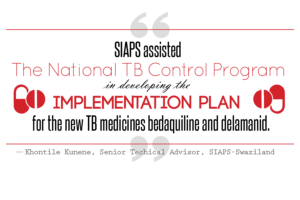In April 2015, USAID and Janssen Therapeutics officially launched the bedaquiline (BDQ) donation initiative, under which Janssen committed to providing free BDQ to 30,000 patients with multidrug-resistant tuberculosis (MDR-TB) over a four-year period. Along with delamanid, BDQ is one of only two new TB medicines released to the market in over 40 years. These medicines are being used for the treatment of MDR-TB patients, as well as TB patients who have experienced life-altering side effects or developed intolerance or resistance to some second-line TB drugs.
We interviewed SIAPS-Swaziland Senior Technical Advisor Khontile Kunene to learn about the implementation of these new TB medicines in Swaziland.
How many patients are expected to receive treatment through the bedaquiline (BDQ) donation program this year?
Approximately 120-150 patients are expected to require bedaquiline in Swaziland in 2016.
In your experience, what problems commonly arise over the course of TB treatment? (i.e. emergence of resistance to medicines, lack of patient adherence to treatment, lack of supplies, etc.)
Our experience with bedaquiline is still new. However with other anti-TB medicines. a combination of complicating factors comes into play. These have included patient adherence issues as well as treatment failure and prolonged treatment.
Patient errors and lack of adherence to treatment regimens can increase drug resistance and render effective treatments ineffective. What steps can be taken in Swaziland to ensure that new TB medicines are used properly by patients?
The Directly Observed Treatment, Short-Course (DOTS) program can be strengthened to ensure that patients are followed up with immediately they miss a dose (either as a result of not showing up at a DOTS facility or not being present for home visits from DOTS nurses). The coordination between DOTS facilities and adherence officers can be strengthened by providing facilities and adherence officers with cell phones and calling vouchers to facilitate communication with patients. Adherence monitoring tools can also be improved to encourage prompt, immediate decision-making at the community level.
How much does treatment for MDR-TB cost in your country?
TB treatment and services are free of charge in Swaziland. The only costs are indirect costs, such as transport money to get to the health facility, time taken off work and caregiver time.
What steps are being taken to access the BDQ donation program? How is SIAPS Program facilitating access to the new TB medications?
SIAPS has assisted in the National TB Control Program (NTCP) on a number of levels. SIAPS has helped develop the implementation plan for new and re-purposed medicines (including new TB medicines BDQ and delamanid, as well as companion medicines). Support for implementing the new medicines has also included the development of clinical guidelines and a pocket guide for BDQ and delamanid use, and the establishment of a clinical access program for BDQ and delamanid, in which an expert team reviews all qualifying cases for use of the new medicines and recommends an appropriate treatment regimen.
Specifically related to the BDQ donation program, SIAPS has quantified the country’s BDQ requirements based on pre-XDR and XDR patient numbers and patients who cannot tolerate second-line treatment regimens due to severe adverse drug reactions. SIAPS also helped the NTCP to prepare the order for bedaquiline through the USAID donation program and facilitate the regulatory approvals for the importation of BDQ, and facilitated the training of clinicians on BDQ use.
What partners have you worked with to implement the BDQ donation program in Swaziland?
We’ve worked with the World Health Organization, Baylor Children’s Foundation, Médecins Sans Frontières (MSF), the Elizabeth Glaser Pediatric AIDS Foundation, the University Research Council, and ICAP.

